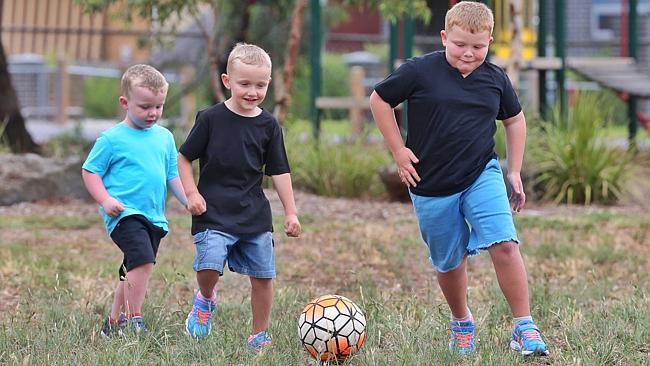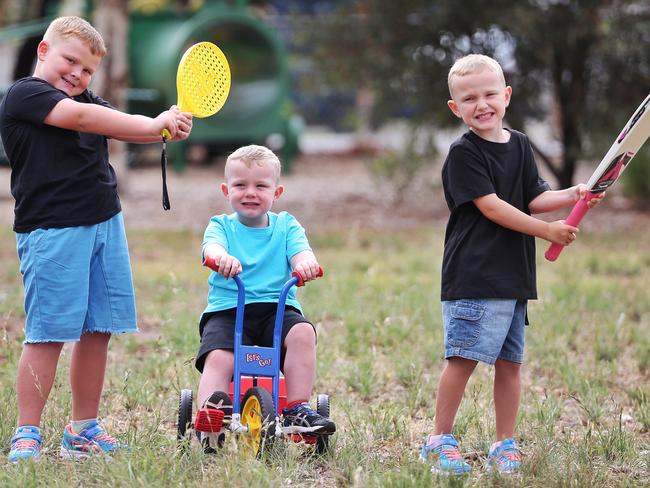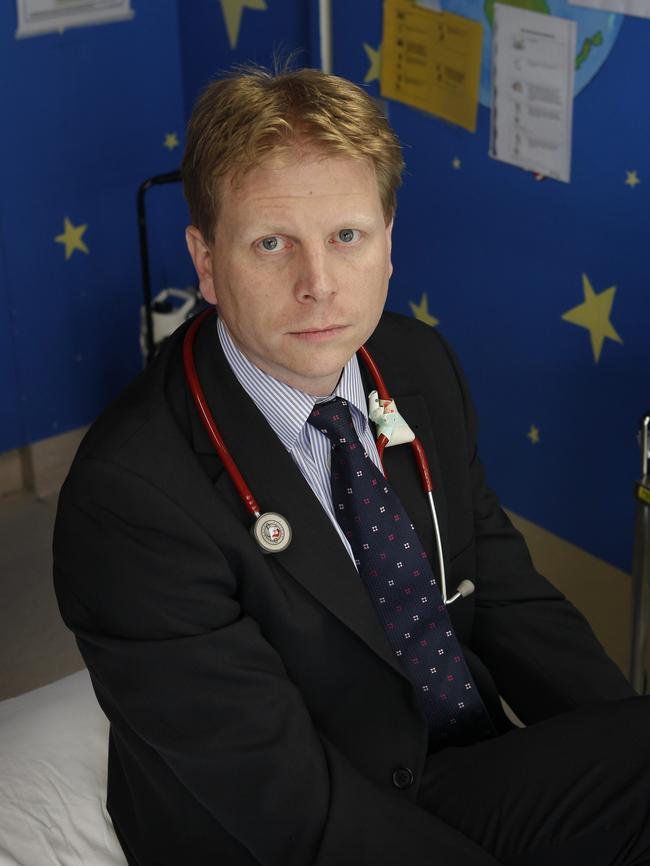Strictly exercising, eating less can be more damaging for overweight, obese children
EXERCISE more and eat less to lose weight. It seems like common sense but strictly abiding by this advice can be more damaging than helpful for overweight and obese children.

VIC News
Don't miss out on the headlines from VIC News. Followed categories will be added to My News.
IT SEEMS like common sense and healthy advice. Exercise more and eat less to lose weight.
But strictly abiding by this simple adage can be more damaging than helpful for overweight and obese children.
Unlike weight gain in adults, which is largely dependent on lifestyle and a person’s own choices, Associate Professor Matt Sabin is on a mission to educate the community that obesity in childhood is much more complicated.
“If a child was really underweight and the parents were saying we’re doing everything we can, but the child isn’t putting on weight; we’d be saying, ‘OK, there must be a medical problem’.
“And yet we don’t do that with obesity. As a society we simply blame the child and the family.”
Associate Prof Sabin heads the Weight Management Clinic at the Royal Children’s Hospital, the largest in Australia and one of the biggest in the world.
The once-a-week service sees more than 1000 patients, aged three to 18, and takes on about 225 new young people a year.

With a quarter of Australian children overweight or obese, non-urgent cases can expect to wait up to a year to be seen at the clinic.
These are not children carrying a bit of extra “puppy fat”.
These are children weighing 35-40kg at age three or four, 70kg by age seven. These are young people who are 220kg by age 14 years, and already have the serious health issues usually only seen in overweight adults; such as Type 2 diabetes, high cholesterol and sleep apnoea so bad they can’t sleep lying down.
But the clinic’s innovative approach of treating obesity like a medical condition, and intervening in the socio-economic, psychological, hormonal and dietary areas of these families’ lives, is paying off.
Their most recent audit found 80 per cent of patients had improvements in their body composition, with a third overall seeing improvements in health markers such as cholesterol and blood pressure.
One recent success is their work getting a 12-year-old, weighing 198kg and with dangerously high blood pressure, down to 77kg.
“We’re still struggling to get good messages across about obesity. Loads of people feel that it’s because kids don’t run around enough, or they eat the wrong kinds of foods and their parents aren’t subjecting them to the right things, and that’s why they end up being as big as they are,” Prof Sabin said.
“But that’s not the case. At least 50 per cent is genetic.
“For example we know that if you’re born small and you have a low birth weight, and you’re pushed with calories in the first couple of years, you’re much more likely to end up obese.
“It’s almost like it’s pejorative to young children; blaming their parents, when in fact it’s probably got very little to do with their parents, it’s probably the fact that’s how the child is.”

‘Simple things’ help control Josh’s weight
KYLIE Butler enrolled her son Josh on the waiting list for the clinic when he was three.
She was adamant that none of her three children would be taunted in the playground like she was, or develop Type 2 diabetes as she did following her first pregnancy.
“He’s one of those kids who’s always got a ball in his hand, always outside playing, so it’s been hard for us and him to understand why he needs this help,” Ms Butler said.
“His younger brother is as skinny as a beanpole. He could eat twice as much as Josh and not put on a thing.
“He’s more stocky than a rolly little kid. But we’re a solid family, so there’s even more reason we needed to do this.”
After spending two years on the waiting list, the clinic has taught the family how to sneak more exercise into Josh’s day, cut down on treat foods and reduce portion sizes; “Simple things,” as Kylie calls them.
One of the challenges — but also one of the blessings for his mental health — is that Josh doesn’t see himself as having a problem with his weight.

It’s meant his parents have needed to play a delicate balancing act to help Josh understand why healthy lifestyle changes are needed — such as walking to school, curbing his Vegemite obsession, and taking up competitive sport, without instilling body dissatisfaction worries.
Now aged seven, Josh has stayed in the same size school uniform for two years during his time on the program.
“I’ve done this for his self-esteem, his confidence,” Ms Butler said. “It’s been a big wake-up call.”

Empowering parents
THE clinic isn’t about removing a parent’s responsibility for their child’s weight gain — Prof Sabin is adamant about that — but instead its effectiveness lies in its ability to empower families.
“A lot of parents come with this pejorative feeling of everyone’s criticising the way they are parenting their child,” he said.
“When you explain a lot of this is probably genetics, you’ve got predisposing factors like maternal weight gain, high pre-pregnancy weight, low birth weight, catch-up growth, reduced breastfeeding; with all of those kinds of things, it’s no great surprise your child is bigger than normal percentiles at 2 ½.
“When you take that responsibility away from the parents, suddenly you’ve engaged them and they feel like they can help now. You empower them to make the change.”
The service includes a general paediatrician, dietitian, Prof Sabin as the endocrinologist to look at hormonal imbalances, a social worker, specialist nurse and psychologist.
As part of the interventions, some children are supervised on very low-calorie diets, others take the tablet Orlistat, which needs approval from the hospital drug usage committee before it can be dispensed to block fat absorption in the body. Some are referred to the Alfred Hospital for bariatric surgery.
“Some families have real trouble understanding the amount of food and quality of the food their child should eat, so they need to see the dietitian more regularly,” he said.
“Some of them are struggling with depression or self-esteem, so they’re more likely to see the psychologist.
“Others are struggling in terms of finances, even getting to the hospital or to swimming classes, so they’ll see our social worker.
“Our experience at the moment is that the success we’re getting depends on us using the whole team.”
Their recent analysis shows that GPs and community paediatricians have trouble assessing obese children, and struggle to work out their medical problems and the cause.
The clinic is looking to start clinical trials for different weight-loss interventions, in the same way cancer patients are assigned to randomised arms of treatment in international research studies.
“It has to be personalised for obesity because the generic common sense, diet and exercise advice just doesn’t work,” he said.
“If an adult is obese and they lose weight, the body really defends that and tries to put the weight back on for about a year and a half.
“If a child has been putting on weight, it’s much easier to get them on a healthier weight trajectory because it’s much more flexible.
“There is a big discussion about whether obesity should be medicalised, but if we don’t then we’re just waiting for these children to get more and more medical problems.”


